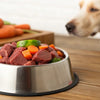Does Raw Dog Food Cause Constipation? Understanding Dietary Impacts on Your Dog's Digestive Health
- Houndsy
Table of Contents
- Introduction
- Understanding Raw Dog Food
- Does Raw Dog Food Really Cause Constipation?
- How to Prevent Constipation in Dogs
- Remedies for Constipation in Dogs
- Conclusion
Introduction
It's surprising, but many dog owners are unaware that their beloved pets can occasionally experience constipation, particularly when on a raw diet. Have you ever noticed your furry friend straining or having trouble during bathroom breaks? This situation is concerning and can lead us to wonder, "does raw dog food cause constipation?" With the rise in popularity of raw feeding, it’s essential to understand how dietary choices can impact our dogs' digestive health.
In this blog post, we will delve into the complex relationship between a raw food diet and constipation, exploring its causes, symptoms, and most importantly, solutions. By the end, you will have a clear understanding of how to manage your dog’s diet to promote optimal digestive health and ensure the well-being of your canine companion. We'll cover what you need to know about raw dog food, the common reasons for constipation, how to prevent it, and remedies to alleviate the symptoms if they do occur.
Addressing this topic is crucial for all dog owners, especially those who are increasingly opting for raw diets, as it empowers us with the knowledge to make informed decisions for our pets. Together, let's explore the intricacies of canine digestion, the potential pitfalls of raw feeding, and ways to enhance our dog's everyday feeding experience.
Understanding Raw Dog Food
The Raw Diet Philosophy
Before we dive into the specifics of constipation, it’s important to understand what a raw dog food diet entails. A raw diet commonly consists of raw meat, bones, fruits, vegetables, and sometimes whole organs. This diet aims to mimic what dogs would naturally consume in the wild.
Many pet owners are turning to this diet because it is believed to offer various health benefits, including improved coat condition, better dental health, and increased energy levels. However, as with any dietary regimen, there are potential challenges and considerations.
Nutritional Composition and Digestive Needs
For a balanced raw diet, it's typically recommended to follow the 80/10/10 rule: 80% muscle meat, 10% bones, and 10% organ meat. This balance provides essential nutrients while mimicking the natural diet of a dog. However, raw feeding can sometimes lead to inconsistencies in nutrient composition and digestive health, which can be a recipe for gastrointestinal issues.
For example, too much bone in a raw diet can lead to hardened stools and, consequently, constipation. In contrast, inadequate fiber may also contribute to digestive issues. Understanding the nutritional needs of your dog is essential to prevent gastrointestinal discomfort and dysregulation.
Does Raw Dog Food Really Cause Constipation?
How Diet Affects Bowel Movements
When examining whether raw dog food causes constipation, we must consider the science behind digestion. The dietary components—particularly the amount of protein and bone—play a significant role in determining stool consistency.
Fiber: The Unsung Hero
Fiber is vital for healthy digestion, as it adds bulk to stool and regulates bowel movements. Raw diets can sometimes fall short when it comes to fiber content, especially if they consist primarily of meat and bones. The lack of fibrous vegetables or other accessible sources can precipitate constipation.
Common Causes of Constipation in Dogs
Understanding why a dog might become constipated on a raw diet involves recognizing various contributing factors. Here are a few leading causes:
-
Excessive Bone Content: As mentioned, too much bone can harden stools, leading to constipation. Dogs can have varying tolerance levels for bone; while some might thrive on a traditional raw diet, others may need a modified approach.
-
Low Hydration Levels: Raw diets are typically higher in moisture than dry kibble, but it's essential for pet owners to ensure their dogs stay hydrated. Insufficient water intake can lead to constipation.
-
Lack of Fiber: While muscle meats and bones are predominant in raw feeding, many raw diets lack adequate plant-based ingredients rich in dietary fiber. Incorporating more fibrous ingredients helps normalize bowel movements.
-
Transitioning Issues: Transitioning from commercial kibble to a raw diet can sometimes lead to temporary digestive upset, including constipation. It’s crucial to introduce new foods gradually to allow the dog’s digestive system to adapt.
-
Medical Issues: Beyond dietary influences, various health conditions can also lead to constipation. Medications, neurological disorders, and blockages in the gastrointestinal tract can all necessitate veterinary attention.
Monitoring Digestive Health
As responsible pet owners, we have an essential role to play in monitoring our dogs’ digestive health. A good practice is to observe your dog’s stool consistency and frequency, noting any changes or irregularities. This awareness can help us identify problems before they escalate.
How to Prevent Constipation in Dogs
1. Balanced Raw Diet
Creating a well-balanced raw diet is paramount in preventing constipation. Ensure you’re adhering to the 80/10/10 model but consider adjusting the bone content based on your dog’s unique tolerance. If your dog struggles with excessive bone, consider reducing it to 5-7% of their meals.
2. Add Fiber-Rich Ingredients
Incorporating fruits and vegetables rich in fiber can contribute to better stool consistency. Options such as pumpkin, sweet potatoes, green beans, and carrots can aid digestion and prevent hardness.
- Pumpkin: Canned (unsweetened) pumpkin is often cited as an excellent addition due to its high fiber content.
- Sweet Potatoes: A great source of carbohydrates and fiber, boiled sweet potatoes can help ease constipation.
3. Ensure Proper Hydration
Encouraging your dog to drink enough water is vital. Fresh water should always be accessible, and you might consider incorporating bone broth or other hydrating liquids into their diet.
4. Regular Exercise
Incorporating regular physical activity helps stimulate bowel movements. Whether it’s agility training, daily walks, or free playtime, engaging your dog in sufficient exercise can promote digestive health.
5. Monitor Transition Periods
When transitioning to a raw diet, do so slowly over several days or weeks. Start by mixing a small amount of raw food with their existing diet while gradually increasing the proportion of raw food over time. This method allows your dog's digestive system to adjust at a comfortable pace.
Remedies for Constipation in Dogs
Despite our best efforts, constipation can still occur occasionally. However, if this does happen, there are proactive steps we can take:
1. Increase Fiber Intake
If constipation arises, consider supplementing your dog’s diet with additional fiber sources immediately. Options include:
- Psyllium Powder: A soluble fiber that can help to absorb moisture and soften stool.
- Slippery Elm Bark: This can soothe the gastrointestinal tract and promote regularity.
2. Reduce Bone Input
In the event of constipation, temporarily reduce the number of bones in their diet. Revert to a meal of boneless meat and organs to promote easier bowel movements.
3. Hydration Help
Adding water or electrolyte solutions to meals can ease dehydration, ensuring proper digestion and helping stools remain soft.
4. Consult Your Veterinarian
If your dog has severe or persistent constipation, consult your veterinarian promptly. They can rule out underlying health issues and provide tailored medical treatments if needed.
5. Home Remedies
Many dog owners have found relief for their pets through simple home remedies, such as offering a little mineral oil, ground flaxseed, or fiber-rich vegetables added to meals. However, consult your vet before starting any new treatment to ensure it aligns with your dog’s health status.
Conclusion
In conclusion, the question of “does raw dog food cause constipation?” is nuanced and dependent on various factors including the composition of the diet, hydration levels, and individual dog health. While a raw food diet can present challenges, particularly regarding constipation caused by excessive bone or inadequate fiber, understanding these dynamics allows us to address and improve our dogs’ digestive health.
Altering your dog's diet with care while keeping a close eye on hydration, fiber intake, and exercise can greatly reduce the risk of constipation. And while the occasional bout may be unavoidable, implementing the remedies and preventive measures we've discussed will aid in maintaining your dog's digestive well-being.
Let’s celebrate our furry friends by ensuring their feeding experience is both satisfying and health-promoting. If you are looking for practical solutions to enhance your dog's eating routine, consider exploring the Houndsy Kibble Dispenser—a beautifully designed product that optimizes feeding time for you and your dog. Get the Houndsy Kibble Dispenser today!
FAQ
1. Is it normal for dogs on a raw diet to experience constipation?
Occasional constipation may occur but it shouldn't be persistent. Ensuring a balanced diet with appropriate fiber and bone content usually prevents issues.
2. How can I tell if my dog is constipated?
Signs include straining to defecate, producing small amounts of hard stool, or not defecating for over 48 hours. If you notice these symptoms, consult your vet.
3. Can I add vegetables to my dog’s raw diet?
Yes, adding suitable vegetables can improve fiber intake and help prevent constipation. Popular choices include pumpkin, sweet potato, and green beans.
4. Should I worry if my dog has constipation often?
Frequent constipation may indicate dietary imbalance or underlying health issues. If constipation occurs regularly, it's worth consulting your veterinarian to address potential concerns.
5. How quickly can I expect to see improvement after changing my dog's diet?
Changes may take a few days to weeks to exhibit effects based on your dog's system and diet adjustments. Continue monitoring their bowel movements during this transition.












